- This event has passed.
2021 Season’s End Summit
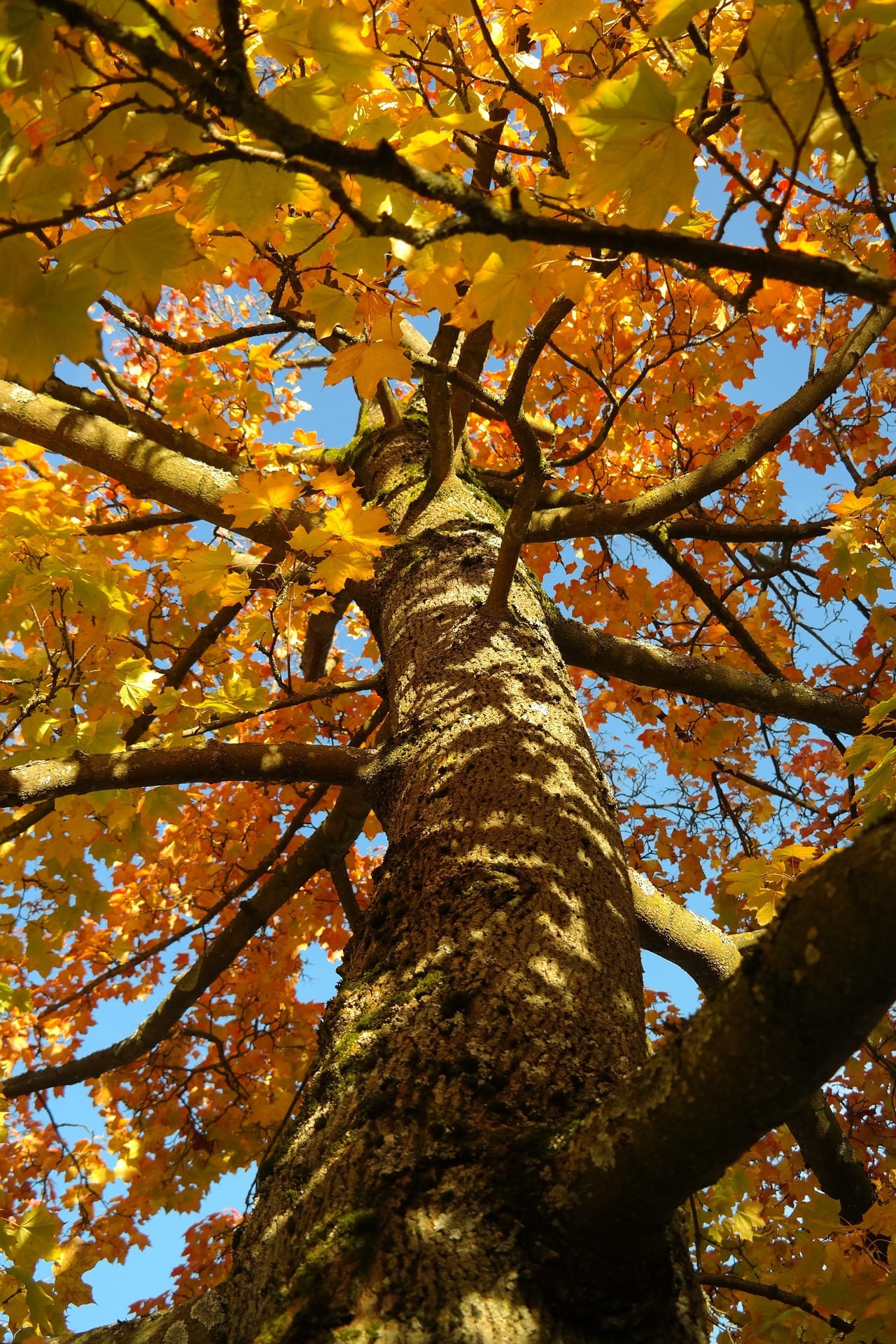
Click to check out the Ecological Plant Conference – December 3.
Conference presentations will be recorded for later viewing by registrants – register today so you won’t miss a thing if you have to be away and can’t attend the day of the conference.
Landscapes Over Time – Lessons Learned
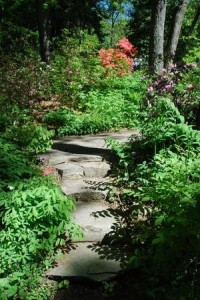 Designed landscapes evolve over time with changes that are sometimes subtle and sometimes dramatic. For optimal results, gardens require continual monitoring and maintenance. Unfortunately, few projects include ongoing engagement with the client, and in general many designers have little involvement after the first year or two.
Designed landscapes evolve over time with changes that are sometimes subtle and sometimes dramatic. For optimal results, gardens require continual monitoring and maintenance. Unfortunately, few projects include ongoing engagement with the client, and in general many designers have little involvement after the first year or two.
Have you wondered how a favorite designs has matured, or how a project has fared over the years?
This fall four expert designers will revisit landscapes that were installed five or more years ago and will share their observations at the ELA Season’s End Summit. A fifth presenter will focus on the importance of design considerations that help to ensure successful outcomes over time including the importance of a management plan.
Join us to explore what lessons can be learned by analyzing original designs and assessing the mature landscapes that resulted. Our experts’ findings will offer insights, inspiration, and a few surprises to consider for your future designs.
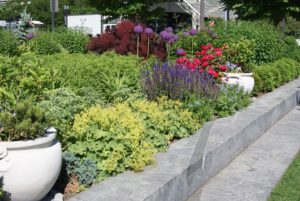
Are They Thriving? Three Examples from The Greenway
Presented by Darrah Cole
The Rose Kennedy Greenway in Boston is a highly artificial, created environment, even for a public park. This makes it an unlikely landscape to manage ecologically with the goal of balancing habitat creation and thriving soil biology with engaging, unique, four-season plant interest. Managed by the nonprofit Greenway Conservancy, all garden and lawn areas of The Greenway are maintained organically by the horticulture staff, with no chemical inputs. Built over a highway tunnel and barely 12 years old, the landscape is old enough to have “grown in”, yet still new enough to trace the original designs and installations. This may be the perfect time to evaluate and assess the success of these landscapes.
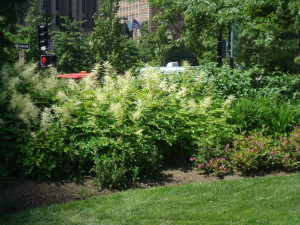 Darrah Cole will present three brief case studies of small confined designs, each under 1500 sq feet; small in contrast to most ecological restoration sites and institutional landscapes. All three areas are planted predominantly, though not exclusively, with native Northeast American plant species. The first is a roadside edge buffer, planted in 2012 with a carefully curated plant palette of native trees, shrubs, grasses, and forbs. The second case study planted from 2010 to 2012 will examine a location along a street but oriented to the interior of the landscape and designed to create a singular look and feel to an entrance into the park. The third will revisit a postage stamp-sized, truly urban, high traffic planting: a small triangular bed between a three-lane surface street, a highway on-ramp and a much used crosswalk.
Darrah Cole will present three brief case studies of small confined designs, each under 1500 sq feet; small in contrast to most ecological restoration sites and institutional landscapes. All three areas are planted predominantly, though not exclusively, with native Northeast American plant species. The first is a roadside edge buffer, planted in 2012 with a carefully curated plant palette of native trees, shrubs, grasses, and forbs. The second case study planted from 2010 to 2012 will examine a location along a street but oriented to the interior of the landscape and designed to create a singular look and feel to an entrance into the park. The third will revisit a postage stamp-sized, truly urban, high traffic planting: a small triangular bed between a three-lane surface street, a highway on-ramp and a much used crosswalk.
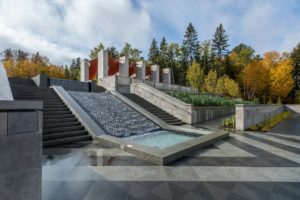 Respecting Ecology & Culture: Resilient Design Principles of Time and Climate
Respecting Ecology & Culture: Resilient Design Principles of Time and Climate
Presented by Sandra Nam Cioffi
The Aga Khan Garden in Edmonton, Canada is the world’s northernmost Islamic garden and at the heart of the University of Alberta’s Botanic Garden. Commissioned by His Highness the Aga Khan, Chairman of the Aga Khan Development Network (AKDN) and spiritual leader of the Ismaili Muslim community, the team at Nelson Byrd Woltz Landscape Architects (NBW) was asked to study classic examples of Mughal gardens to create a contemporary expression of an Islamic garden in the 21st century. The 10-acre garden is sited around the existing Calla Pond, adjacent to a series of Canadian wetlands, and on top of a complex network of sand dunes.
Landscape architect Sandra Nam Cioffi was an integral member of the design team during five years of research, design, and construction phases of the Aga Khan Garden while she worked at NBW. For this presentation, Sandra will revisit this landscape and discuss how the original design responds to local ecologies in the tradition of the Islamic environmental ethic. Sandra will then walk participants through lessons learned since the garden’s official opening to the public in 2018, and discuss how in its early years of maturity, the garden continues to endure changing management regimes and the appetites of hungry moose.
Luncheon Keynote
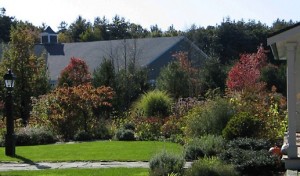 Design Meets Stewardship: Making Designs for Nature to Run With
Design Meets Stewardship: Making Designs for Nature to Run With
Presented by Laura Kuhn
What does maintenance mean in an ecological landscape? How can designers develop a clear “vision” for a space that will progress over time?
Successful ecological design is not a matter of checklists, native plant lists, and good intentions. Planning for pollinators & understanding plant interactions matter – a lot! But designing for ecological health *and* longevity often comes down to setting client expectations, team selection, and making clear design choices while knowing how nature will take our plans and run with them.
As designers, we need to ask ourselves: what parts of our designs should we plan to preserve for posterity & resident enjoyment, and where do we accept succession, regeneration, and for nature to show us what’s what?
In this presentation, we will look at how and when design intersects with stewardship: like a web, they influence each other in complex ways. How can we foster client understanding of the natural processes that are unleashed by our specifications? When during our design process should we start talking about maintenance vs stewardship? When do we recommend and introduce team members? What is the role of the designer post-installation – even years later? Laura Kuhn will offer a model for a design process that yields not just the big picture, but that also highlights the interactive role of people and nature that ultimately shapes the landscapes we live with.
People have been shaping nature for millennia – to healthy and unhealthy ends. As today’s ecological designers, we have tremendous influence over the health of private landscape ecologies that cover much of the northeastern US. When we embrace design with natural processes in mind, we have the potential to create more resilient and regenerative landscapes, foster a deeper understanding of nature among our clients, and more successfully support eco-region health.
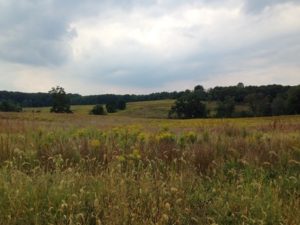 Revisiting the Meadow Garden at Longwood
Revisiting the Meadow Garden at Longwood
Presented by Tom Brightman and Lea Johnson
The Meadow Garden at Longwood Gardens in Kennett Square, PA, which opened in 2014, is an 84-acre meadow landscape that integrates an historic naturalized meadow with newly-designed spaces – including woodland edges, planted “hot-spots” within the meadow, and a roadbed and hay fields restored to native meadow species. Additional features were integrated during the design process to enhance the visitor experience of the Meadow Garden, including interpretive signage and buildings, an expanded trail network, and programming. Tom Brightman was involved in the Meadow Garden project from the planning phase. Tom will give an overview of the original design concepts, installation, maintenance, and interpretive practices. Lea Johnson directs land stewardship and ecological research at Longwood Gardens, and she will describe recent advances in science-based management of the Meadow Garden. Together, they will reflect on the Meadow Garden’s development, maintenance challenges, and its impact as an ecological intervention and public garden space after eight years
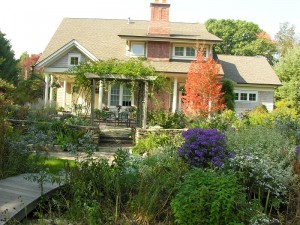 The Gift or Curse of Hindsight: Learning from Nature, the Master Designer
The Gift or Curse of Hindsight: Learning from Nature, the Master Designer
Presented by Michael Nadeau
We all wish we could go back in time and change things we did or didn’t do or apply what we know now to what we didn’t know then.
Garden design is no exception. Since we learn from our mistakes it is valuable to revisit what worked and what fell short of our expectations. This presentation takes a humble look at several projects in hindsight and what can be gleaned to create more successful future designs.
Speaker Bios
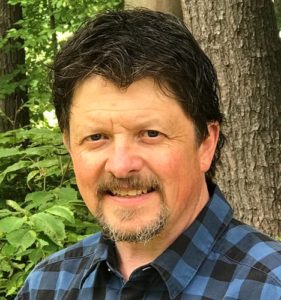 Tom Brightman is the Principal of Osprey Ecological Services, LLC, in Dover, New Hampshire, working with private and public landowners to create and restore wildlife habitats at the nexus of nature and culture. He has over 20 years’ experience as a land and water stewardship professional and is currently the consulting Land Stewardship Coordinator for the Town of Durham, NH, where he conducts habitat management activities in a variety of ecosystems, manages trail construction and maintenance, and oversees volunteer resources.
Tom Brightman is the Principal of Osprey Ecological Services, LLC, in Dover, New Hampshire, working with private and public landowners to create and restore wildlife habitats at the nexus of nature and culture. He has over 20 years’ experience as a land and water stewardship professional and is currently the consulting Land Stewardship Coordinator for the Town of Durham, NH, where he conducts habitat management activities in a variety of ecosystems, manages trail construction and maintenance, and oversees volunteer resources.
His previous work has included serving as a Wildlife Habitat Biologist in the NH Fish & Game’s Non-Game and Endangered Species program. Tom also spent over a decade as the Land Stewardship Manager for Longwood Gardens in Kennett Square, PA, where he managed stewardship activities supporting ecosystem health on natural, horticultural, and agricultural landscapes – including: ecosystem restoration; trail design and construction; garden design; visitor education, interpretative programming and events; volunteer management, and community outreach. He was intimately involved in the planning, implementation, and maintenance of Longwood’s Meadow Garden. Tom has a B.A. in American Civilization, and a Master of Environmental Studies (MES), both from the University of Pennsylvania. He teaches Land Conservation and Management in Penn’s MES program.
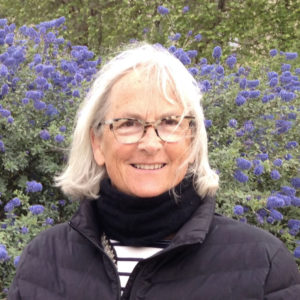
Darrah Cole joined the Rose Kennedy Greenway Conservancy in April 2011 and is responsible for the Conservancy’s horticulture design including shrubs and perennials, bulb selections, and container design. She implemented the Pollinator Ribbon concept and led the installation of The Greenway’s first urban Wildflower Meadow in 2019, and also collaborated on the recent Carolyn Lynch Garden renovation project in the North End. Darrah manages the Conservancy plant records, and contributes to the “What’s in Bloom” blog. Known for her “good eye,” Darrah’s extensive plant knowledge leads to both subtle and striking combinations. Darrah previously worked at Heronswood Nursery in the Pacific Northwest, and has managed private estate gardens in Maine, Massachusetts, and Washington State. She studied at the Rhode Island School of Design, and holds a B.A. from San Francisco State University, as well as AOLCP and MCH certifications.
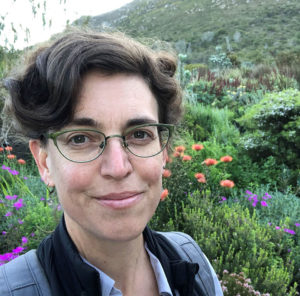 Lea Johnson is Associate Director, Land Stewardship and Ecology at Longwood Gardens, where she directs management of Longwood’s diverse natural lands for both ecological integrity and guest experience. She is a plant ecologist who works to advance the science and practice of ecosystem management for people and biodiversity in a changing world. She collaborates across disciplines and professions to address wicked problems in complex social-ecological systems, and she is interested in processes that unfold over time at multiple scales. Her research has been recognized with a professional honor award by ASLA. Her career has taken her to a variety of ecosystems, from the mountains of New Mexico and temperate rainforests of Oregon to the highlands of Guatemala and back woods of New York City. She earned an M.S. in Biology and Natural Resource Management from New Mexico Highlands University, an M.A. in Science Education from the City University of New York, and a Ph.D. in Ecology and Evolution from Rutgers University.
Lea Johnson is Associate Director, Land Stewardship and Ecology at Longwood Gardens, where she directs management of Longwood’s diverse natural lands for both ecological integrity and guest experience. She is a plant ecologist who works to advance the science and practice of ecosystem management for people and biodiversity in a changing world. She collaborates across disciplines and professions to address wicked problems in complex social-ecological systems, and she is interested in processes that unfold over time at multiple scales. Her research has been recognized with a professional honor award by ASLA. Her career has taken her to a variety of ecosystems, from the mountains of New Mexico and temperate rainforests of Oregon to the highlands of Guatemala and back woods of New York City. She earned an M.S. in Biology and Natural Resource Management from New Mexico Highlands University, an M.A. in Science Education from the City University of New York, and a Ph.D. in Ecology and Evolution from Rutgers University.
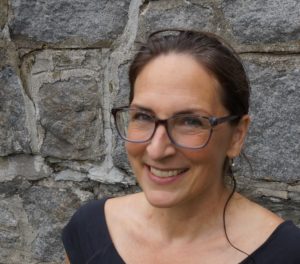 Laura Kuhn is a landscape designer who specializes in ecological landscapes and creates custom artistic and wild spaces for private clients in the New England region and beyond. For more than twenty years she has offered landscape design strategy and restoration including installation of projects from small urban parcels to large estate gardens. Her certifications include MCH, MCLP, and NOFA AOLCP. She currently serves on MNLA’s Government Relations Committee. In the past, she enjoyed serving as Advocacy Chair for the Association of Professional Landscape Designers (APLD), serving on the MCLP certification committee for Massachusetts Certified Landscape Professionals, and most of all, teaching at the Landscape Institute.
Laura Kuhn is a landscape designer who specializes in ecological landscapes and creates custom artistic and wild spaces for private clients in the New England region and beyond. For more than twenty years she has offered landscape design strategy and restoration including installation of projects from small urban parcels to large estate gardens. Her certifications include MCH, MCLP, and NOFA AOLCP. She currently serves on MNLA’s Government Relations Committee. In the past, she enjoyed serving as Advocacy Chair for the Association of Professional Landscape Designers (APLD), serving on the MCLP certification committee for Massachusetts Certified Landscape Professionals, and most of all, teaching at the Landscape Institute.
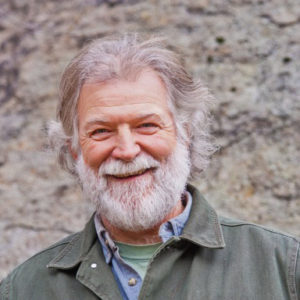 Michael Nadeau has been intrigued by and working in the landscape and tree business since the age of 12. With a great respect of Nature, Michael was an early proponent of sustainability and worked with NOFA to develop the first-ever Standards for Organic Land Care and the Organic Land Care Accreditation Course which he also teaches. Michael (and brother, Dan) co-founded Plantscapes Organics, Inc. in 1982. A few years ago, he retired from that business and went on to create Wholistic Land Care Consulting, LLC, a nature-based landscape consulting firm, where he continues to learn from Nature. With more than three decades of Nature-based landscape experience, Michael is passionate about educating land care stewards about the overdependency on synthetic chemicals, the environmental consequences of their use, and natural alternatives for land management.
Michael Nadeau has been intrigued by and working in the landscape and tree business since the age of 12. With a great respect of Nature, Michael was an early proponent of sustainability and worked with NOFA to develop the first-ever Standards for Organic Land Care and the Organic Land Care Accreditation Course which he also teaches. Michael (and brother, Dan) co-founded Plantscapes Organics, Inc. in 1982. A few years ago, he retired from that business and went on to create Wholistic Land Care Consulting, LLC, a nature-based landscape consulting firm, where he continues to learn from Nature. With more than three decades of Nature-based landscape experience, Michael is passionate about educating land care stewards about the overdependency on synthetic chemicals, the environmental consequences of their use, and natural alternatives for land management.
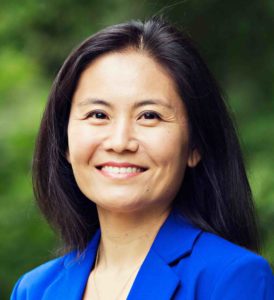 Sandra Nam Cioffi is the Founding Principal of Ink Landscape Architects, PLLC, Creator of the CUT|FILL conference series for civic design practices, and Chief Operations Officer at QiqoChat Inc. Trained in human-centered design and project management, her goal is to advance the real-world impact of empathy tech. Sandra is a licensed landscape architect in New York and Virginia. She has designed and managed projects across the United States and abroad, including complex urban, institutional, and cultural projects while at Nelson Byrd Woltz Landscape Architects, Parker Rodriguez Inc, and Margie Ruddick Landscape. Her work has been recognized by the Virginia and Potomac Chapters of ASLA, AIA|DC. Sandra is a 2012 University Olmsted Scholar, awarded by the Landscape Architecture Foundation. Prior to becoming a landscape architect, Sandra was a Marketing Consultant for The Nature Conservancy, and Marketing Manager in the luxury fine fragrance industry in New York City. Sandra holds a Master of Landscape Architecture from Virginia Tech and a BA from The University of Chicago. She is on the PDC Designing New York: Streetscapes Steering Committee and volunteers for Green Schoolyards America.
Sandra Nam Cioffi is the Founding Principal of Ink Landscape Architects, PLLC, Creator of the CUT|FILL conference series for civic design practices, and Chief Operations Officer at QiqoChat Inc. Trained in human-centered design and project management, her goal is to advance the real-world impact of empathy tech. Sandra is a licensed landscape architect in New York and Virginia. She has designed and managed projects across the United States and abroad, including complex urban, institutional, and cultural projects while at Nelson Byrd Woltz Landscape Architects, Parker Rodriguez Inc, and Margie Ruddick Landscape. Her work has been recognized by the Virginia and Potomac Chapters of ASLA, AIA|DC. Sandra is a 2012 University Olmsted Scholar, awarded by the Landscape Architecture Foundation. Prior to becoming a landscape architect, Sandra was a Marketing Consultant for The Nature Conservancy, and Marketing Manager in the luxury fine fragrance industry in New York City. Sandra holds a Master of Landscape Architecture from Virginia Tech and a BA from The University of Chicago. She is on the PDC Designing New York: Streetscapes Steering Committee and volunteers for Green Schoolyards America.
Agenda
| 8:30 – 9:00 | Check-in and Tech Check |
| 9:00 – 10:00 | Darrah Cole – Are They Thriving? Three Examples from The Greenway |
| 15-minute break | |
| 10:15 – 11:15 | Sandra Nam Cioffi – Respecting Ecology & Culture: Resilient Design Principles of Time and Climate |
| 15-minute break | |
| 11:30 – 12:30 | Laura Kuhn – Design Meets Stewardship: Making Designs for Nature to Run With |
| 45-minute break | |
| 1:15 – 2:15 | Tom Brightman and Lea Johnson – Revisiting the Meadow Garden at Longwood |
| 15-minute break | |
| 2:30 – 3:30 | Michael Nadeau – The Gift or Curse of Hindsight: Learning from Nature, the Master Designer |
3:30 – 4:00 CEU Processing – Networking
Continuing Education Credits
CEUs have been approved for this program by APLD, ASLA (LA CES), MCH, MALP, and NOFA.
Details
- Date:
- Wed, October 27, 2021
- Time:
-
8:30 am EDT - 4:30 pm EDT
- Event Category:
- Conferences
Organizer
- ELA Office
- Email:
- ELAInfo@ecolandscaping.org
- Website:
- View Organizer Website


